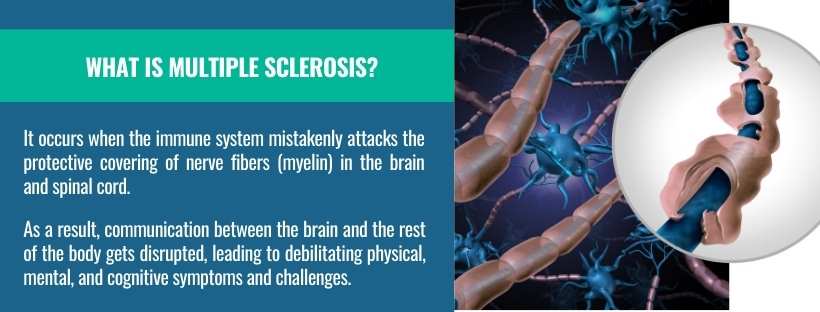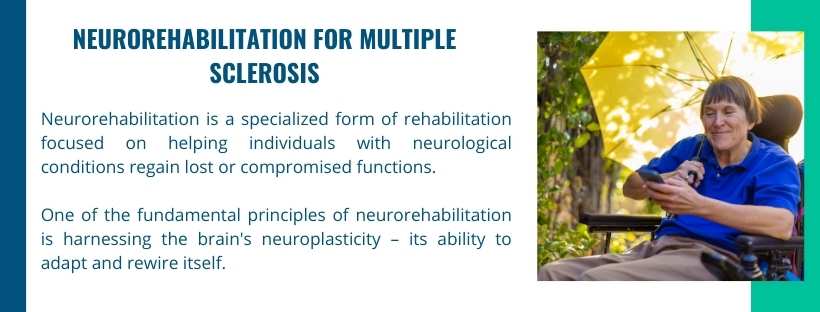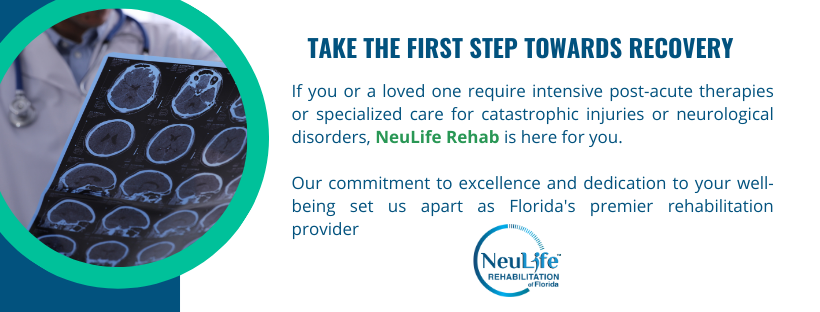Multiple sclerosis is a complex autoimmune disease affecting almost 2.8 million people worldwide. It disrupts communications between the brain and the rest of the body, leading to various symptoms that drastically impact daily functioning.
From numbness and muscle weakness to difficulties with mobility and coordination, the struggles faced by those with this condition can be both daunting and disheartening.

But amidst these challenges, a ray of hope emerges - the power of neurorehabilitation. This isn't your run-of-the-mill therapy; it's a personalized approach that empowers MS patients to rewrite their narrative, reclaim their independence, and embrace life with newfound vigor.
Get ready to be inspired, educated, and uplifted as we explore the critical components of neurorehabilitation that breathe new life into the paths of those with multiple sclerosis.
Multiple sclerosis一often referred to as MS一is a chronic autoimmune disease that affects the central nervous system. It occurs when the immune system mistakenly attacks the protective covering of nerve fibers (myelin) in the brain and spinal cord.
As a result, communication between the brain and the rest of the body gets disrupted, leading to debilitating physical, mental, and cognitive symptoms and challenges.
The exact cause of multiple sclerosis (MS) is still a mystery, but it is thought to be a complex interaction of genetic, environmental, and immunological factors.
In MS, the immune system mistakenly attacks the myelin sheath, a protective covering that surrounds nerve fibers.
As the myelin gets destroyed, the nerve signal transmission in the brain will get disrupted. Additionally, lesions may also form in some regions of the brain and spinal cord. These can then lead to a multifaceted set of symptoms that can affect the nervous system:
Demyelination (destruction of myelin sheath) affects nerve fibers responsible for controlling movement, thus leading to:
These motor symptoms can significantly impact a person's ability to perform daily activities.
Demyelination of sensory nerve fibers can cause sensations of numbness, tingling, burning, or pins and needles in various parts of the body. These sensory disturbances may be experienced in the limbs, face, or torso.
MS can affect the optic nerves, which transmit visual information from the eyes to the brain. This can lead to vision problems, such as blurry vision, double vision (diplopia), or even partial or complete vision loss in one eye.
In some individuals, multiple sclerosis can cause cognitive changes, affecting memory, attention, concentration, problem-solving, and information processing.
Multiple sclerosis can also affect emotions and mood. Some individuals may experience mood swings, depression, anxiety, or emotional lability (rapid emotional shifts).
Fatigue is a common and often debilitating symptom of MS. It is characterized by extreme tiredness and lack of energy, even after minimal physical or mental exertion.
It can result from the combination of physical and cognitive impairments, as well as the body's constant efforts to repair the damaged myelin.
As the disease progresses, it can lead to more severe disabilities, affecting one's ability to perform daily activities and impacting the overall quality of life.
Neurorehabilitation is a specialized form of rehabilitation focused on helping individuals with neurological conditions regain lost or compromised functions.
Unlike traditional therapies that merely target symptoms, neurorehabilitation takes a holistic approach. It aims to optimize the brain's ability to adapt and rewire itself through neuroplasticity. This way, it addresses the root causes of MS-related impairments and fosters long-lasting improvements.
One of the fundamental principles of neurorehabilitation is harnessing the brain's neuroplasticity – its ability to adapt and rewire itself.
Neuroplasticity allows the brain to form new connections and pathways to compensate for areas affected by injury or disease. Neurorehabilitation techniques are designed to promote this rewiring and encourage the brain to find alternative ways to function.
Neurorehabilitation offers a tailored approach to address various multiple sclerosis symptoms and disabilities.

Each patient receives a personalized treatment plan based on their unique needs. Let's take a closer look at how it targets specific MS challenges:
Physical therapy is a cornerstone of neurorehabilitation for MS patients. It's all about getting those muscles moving, strengthening them, and enhancing balance and coordination.
Physical therapists skilled in neurological conditions assess patients' needs and tailor exercises to address their specific challenges. Some examples include:
Through targeted exercises and techniques, physical therapists help MS patients regain control over their movements and reduce the risk of falls.
Occupational therapy is all about regaining independence in the activities that bring meaning and purpose to our lives. After all, who doesn't want to maintain their ability to cook their favorite meals or dress up easily?
Occupational therapists work with MS patients to enhance their ability to perform everyday activities, such as dressing, cooking, and bathing.
They may recommend adaptive devices or strategies to promote independence and make daily tasks more manageable.
Communication is a fundamental aspect of human interaction, and speech therapy plays a crucial role in helping patients with multiple sclerosis overcome speech and language difficulties.
Speech therapists assess speech patterns, language skills, and swallowing abilities to design targeted exercises and techniques. They will step in to improve communication skills and ensure safe eating and drinking.
Cognitive challenges are common in people with multiple sclerosis. It can be particularly frustrating for patients to deal with problems with memory loss, attention, and problem-solving abilities.
Cognitive rehabilitation aims to retrain and strengthen cognitive abilities, helping patients adapt to their changing mental landscape. It focuses on retraining cognitive skills, enabling individuals to adapt to and cope with these challenges more effectively.
Neurorehabilitation brings about a myriad of improvements in physical, emotional, and mental well-being for individuals undergoing rehabilitation.
Increased social engagement: The physical and emotional benefits of rehab can lead to increased social interaction and participation in hobbies, activities, and community events.

Remember, rebuilding paths after an MS diagnosis is possible, and neurorehabilitation serves as a beacon of hope for individuals and their support networks.
NeuLife Rehab is a state-of-the-art inpatient facility dedicated to empowering individuals on their journey to recovery. We specialize in treating traumatic brain injuries (TBI), spine injuries, amputations, serious orthopedic injuries, and a range of neurological disorders.
Our team of experienced therapists and medical professionals design personalized treatment plans to maximize your potential for recovery. Some of the programs we provide include:
If you or a loved one require intensive post-acute therapies or specialized care for catastrophic injuries or neurological disorders, NeuLife Rehab is here for you.
Our commitment to excellence and dedication to your well-being set us apart as Florida's premier rehabilitation provider. Contact us now at 352-492-3475 to learn more.
The material contained on this site is for informational purposes only and DOES NOT CONSTITUTE THE PROVIDING OF MEDICAL ADVICE, and is not intended to be a substitute for independent professional medical judgment, advice, diagnosis, or treatment. Always seek the advice of your physician or other qualified healthcare providers with any questions or concerns you may have regarding your health.

We know that choosing the next step in your recovery from a catastrophic illness or injury is complex. Together, we can help you take the next step.
Contact us with any questions today.